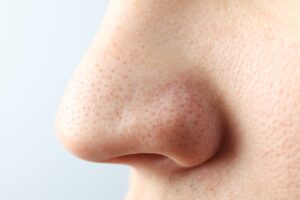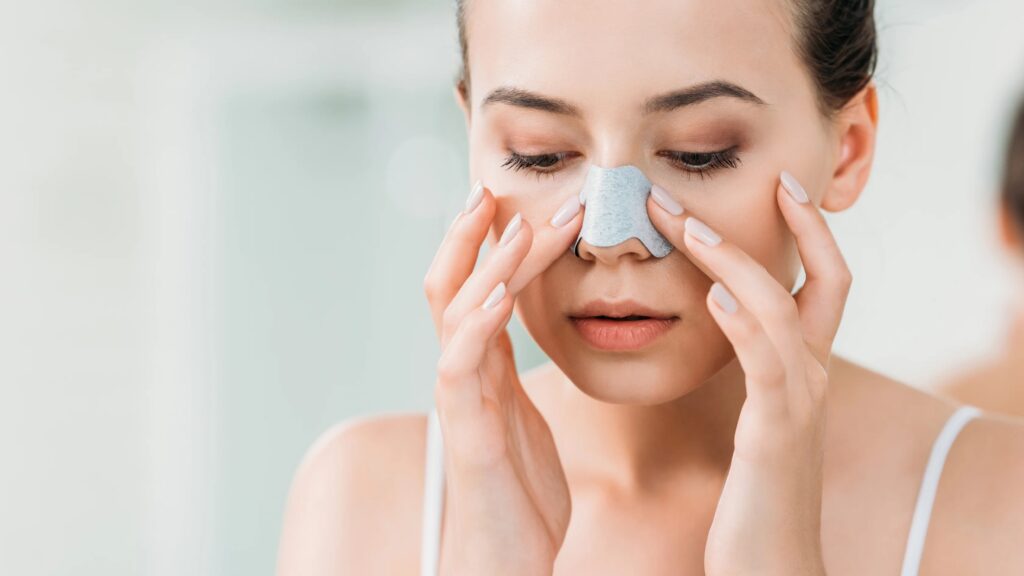Blackheads are a common skin concern many individuals face, often causing frustration and a desire for precise, smooth skin. These small, dark bumps on the skin’s surface are typically found on the face, neck, chest, back, and shoulders.
What are blackheads?
Blackheads, also known as open comedones, are acne characterized by clogged hair follicles. They get their distinctive black appearance from the oxidation of the sebum (skin oil) and dead skin cells, not dirt, as commonly believed. Unlike whiteheads, blackheads have open pores, exposing the trapped material to air and resulting in a dark colour.
Causes of blackheads:
- Excess Sebum Production: One of the primary causes of this is the overproduction of sebum by the sebaceous glands. Excessive oil can mix with dead skin cells and clog pores, leading to the formation of blackheads.
- Poor Skin Hygiene: Inadequate cleansing habits can contribute to the accumulation of oil, dead skin cells, and impurities on the skin’s surface, creating an environment conducive to blackhead formation.
- Hormonal Changes: Hormonal fluctuations, especially during puberty, menstruation, pregnancy, and menopause, can stimulate the sebaceous glands, increasing oil production and the likelihood of it.
- Certain Medications: Some medications, such as corticosteroids, androgens, and birth control pills, can influence hormone levels and contribute to the development of blackheads.
- Cosmetic Products: Using comedogenic (pore-clogging) cosmetics and skin care products can exacerbate blackhead formation.

Treatment Options:
-
Gentle Cleansing:
Use a mild, non-comedogenic cleanser to wash your face twice daily to remove excess oil and impurities.
Avoid harsh scrubs or abrasive cleansers, as they irritate the skin and worsen blackhead.
-
Topical Retinoids:
Over-the-counter or prescription retinoid creams containing ingredients like adapalene or tretinoin can help unclog pores and promote cell turnover, reducing the appearance of blackheads.
-
Salicylic Acid:
Products containing salicylic acid can effectively exfoliate the skin, helping to remove dead skin cells and prevent the formation of blackheads.
-
Extraction:
Professional extraction by a dermatologist can safely remove stubborn blackheads without causing scarring or infection.
-
Clay Masks:
A weekly application of clay masks can help absorb excess oil and impurities, preventing blackheads.
-
Oil-Free Moisturizers:
Use oil-free and non-comedogenic moisturizers to keep the skin hydrated without exacerbating it.
Prevention Tips:
- Regular Exfoliation: Incorporate a gentle exfoliant into your skincare routine to prevent the buildup of dead skin cells.
- Balanced Diet: Maintain a balanced diet rich in fruits, vegetables, and water to support overall skin health.
- Avoid Pore-Clogging Products: Choose non-comedogenic skincare and cosmetic products to reduce the risk of blackhead.
- Hands Off: Avoid picking or squeezing blackheads, leading to inflammation, infection, and scarring.
Conclusion:
Understanding the causes and effective treatment options for blackheads is essential for achieving precise and healthy skin. Individuals can effectively manage and prevent it by adopting a consistent and gentle skincare routine, making lifestyle adjustments, and seeking professional guidance when necessary.
